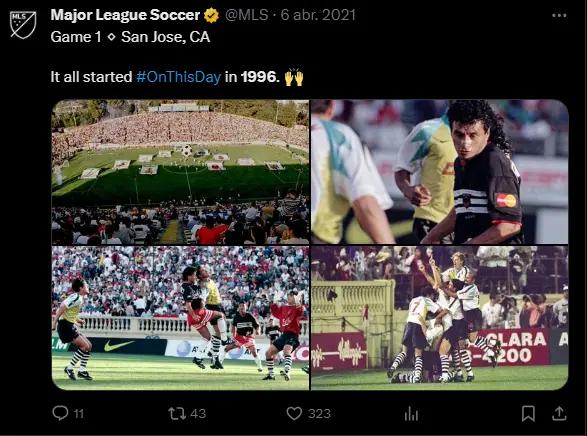The night the MLS was born: a journey to the inaugural match
Discover how the first MLS match unfolded, marking the boost of soccer in the United States.

The night of April 6, 1996, marked a milestone in the history of American soccer: the birth of Major League Soccer (MLS). At Spartan Stadium in San Jose, California, the league's first official match took place between San Jose Clash and D.C. United, an event that not only inaugurated a new era for the sport in the United States but also laid the foundation for the growth and popularity of soccer in the country.
The context before the birth of MLS
The need for a professional league in the United States
After the success of the 1994 World Cup, held in the United States, FIFA and the United States Soccer Federation (USSF) recognized the need to establish a professional league that could capitalize on the growing interest in soccer in the country. Thus, in 1993, Major League Soccer was founded with the goal of providing a high-level competition and fostering the development of the sport nationally.
The initial challenges and team formation
The creation of MLS was not without its challenges. The league began with ten teams: Columbus Crew, D.C. United, New England Revolution, NY/NJ MetroStars, Tampa Bay Mutiny, Colorado Rapids, Dallas Burn, Kansas City Wiz, Los Angeles Galaxy, and San Jose Clash. Each franchise faced the task of building competitive rosters and attracting a fan base in a country where soccer was not yet the dominant sport.

The inaugural match: San Jose Clash vs. D.C. United
Preparations and expectations
On April 6, 1996, Spartan Stadium was filled with 31,683 spectators eager to witness the first MLS match. The atmosphere was electric, with fans and media focused on the teams' performances and the future of the league. The presence of prominent figures like Eric Wynalda and John Harkes added a special appeal to the event.
The match's progression
The game was competitive from start to finish. Both teams displayed dynamic play, showcasing the potential of the new league. In the 88th minute, Eric Wynalda, forward for San Jose Clash, scored the only goal of the match, securing victory for his team and making history as the scorer of the first MLS goal.
Impact and legacy of the inaugural match
Immediate reactions
The victory of San Jose Clash and the overall performance of the match were met with enthusiasm from fans and critics alike. The success of the inaugural event provided significant momentum to MLS, proving there was a genuine market and interest in professional soccer in the United States.
Influence on MLS growth
This first match laid the groundwork for the league's growth and expansion. Over the years, MLS has undergone remarkable evolution, incorporating new franchises, building soccer-specific stadiums, and attracting internationally renowned players. The inaugural game is remembered as the starting point of this transformative journey.
The evolution of MLS since 1996
League expansion and development
From its beginnings with ten teams, MLS has grown significantly. By the 2024 season, the league includes 29 teams, including franchises in Canada. This growth reflects the increasing popularity of soccer in North America and MLS's success in establishing itself as a competitive league on the global stage.
Recruitment of international players
Over the years, MLS has attracted world-class players, raising the competition level and increasing the league's visibility. The arrival of stars like David Beckham, Thierry Henry, and, more recently, Lionel Messi, has been crucial for MLS's growth and popularity.
The cultural impact of the inaugural match
Promoting interest in soccer in the United States
The inaugural MLS match not only marked the start of a professional league but also played a vital role in promoting interest in soccer in the United States. Media coverage and community participation helped establish a solid fan base that has grown exponentially since then.
Inspiring future generations
The realization of this first match and the establishment of MLS have inspired countless young people to play and follow soccer. The league has served as a platform for developing local talent, contributing to the strengthening of American soccer on the international stage.

Conclusion
The night of April 6, 1996, when San Jose Clash and D.C. United faced off in the first MLS match, marked the birth of a new era for soccer in the United States. This historic event not only inaugurated a professional league but also laid the groundwork for the growth and popularity of soccer in the country. Since then, MLS has evolved and established itself as a competitive and respected league worldwide, with a legacy that continues to inspire future generations of fans and players.
More news

THE GANG IS HERE! First Argentine Stars Arrive in Buenos Aires for Final Qualifier Push!
01/09/2025

THE LAST DANCE! Lionel Messi Confirms His Final World Cup Qualifier in Argentina!
29/08/2025

TRANSFER COLLAPSES! Julio Enciso Fails Medical Exams, Returns to Brighton!
27/08/2025

Vini doesn't feel entirely comfortable at Real Madrid anymore and is seeking a future at another club
26/08/2025

HERE WE GO! Piero Hincapié Says YES to Arsenal, Club Prepares Final Bid for Leverkusen Star!
26/08/2025

THE REAL MADRID SHOWDOWN: Nico Paz's Future Sparks a Bidding War Across Europe!
25/08/2025

SOUTH AMERICAN SHAME: Independiente vs. U. de Chile Match Canceled After Horrific Incidents!
21/08/2025

Rodrygo Benched by Xabi Alonso: The End of an Era at Real Madrid?
20/08/2025

PARIS IN PARIS! The New Superclub, Paris FC, Rises to Threaten PSG-Marseille Rivalry!
20/08/2025

PSG’s €850M Budget is 30x Larger Than the Smallest in Ligue 1!
19/08/2025

THE DEBUTS ARE HERE! Estupiñán & Modrić Step Onto the San Siro Stage!
18/08/2025

CONTROVERSY IGNITES! Barcelona Opens Season with a Contested 2-0 Victory Over Mallorca!
18/08/2025

SCANDAL ESCALATES: Donnarumma's Harsh Letter Responds to Luis Enrique's Super Cup Snub!
15/08/2025

Franco Mastantuono: A New Number 30 for Real Madrid with a Nod to the Past
14/08/2025

HISTORY MADE! PSG Wins First-Ever Super Cup Title in Thrilling Penalty Shootout!
14/08/2025

Mastantuono Arrives at Valdebebas for Real Madrid Presentation
13/08/2025

ON AND OFF THE PITCH: Is Nicki Nicole the New WAG of Barcelona's Lamine Yamal?
13/08/2025

Donnarumma Bids Farewell to Paris Saint-Germain at the Peak of His Career
13/08/2025



